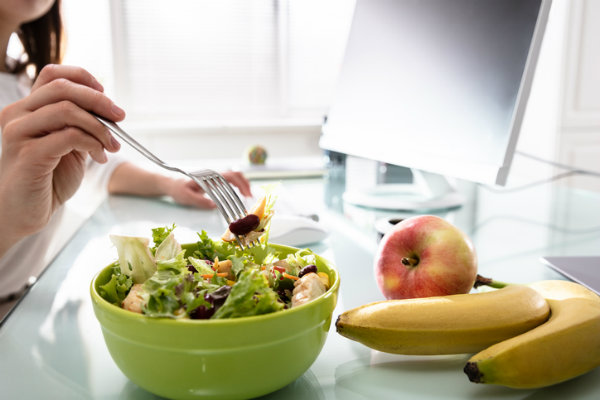Healthy Food Options for Busy College Students

Too many snacks, large meal portions, decreased activity—these poor habits are not only unhealthy, they may affect academic performance. A 2020 study published in the Journal of American College Health (JACH) found that healthy eating is a factor in higher academic achievement among college students.
Healthy eating is essential for everyone, of course. But for busy people trying to balance work, school, family, and social activities, it is especially important. Find out more about brain food for college students.
Poor Eating Is Associated With Poor Health
Why is eating healthy important for college students? Poor nutrition is associated with these potential consequences, according to the U.S. Centers for Disease Control and Prevention:
- Weight gain and obesity
- Heart disease and stroke
- Type 2 diabetes
- Cancer
- Brain function deficits
College students who reported eating fast food more than seven times a week had much lower GPAs than those who reported eating it less than four times a week or not at all, according to the JACH study.
These studies reinforce what most of us know: eating well offers you the best chance at success. As a busy college student, eating healthy is a bigger challenge, but it can be accomplished by following a few helpful tips.
Nutrition Tips for Busy College Students

Busy people don’t have a lot of time to prepare and eat healthy meals. It can be helpful to have a quick list of ideas to maintain healthy eating.
Balance Your Meals
Strive to eat from at least three different food groups every day to help ensure you’re getting proper nutrition. Choose items from these food groups:
- Dairy
- Fruits
- Grains
- Healthy fats
- Protein
- Vegetables
Cut down sharply on foods high in solid fats, added sugars, and salt. This includes:
- Cake
- Candy
- Cookies
- Ice cream
- Pizza
- Sweetened drinks
- Fatty meats such as bacon, hot dogs, ribs, and sausages
Drink Water
Proper hydration is important for your body’s health. Roughly 20% of the water you intake daily is in the food you eat, the Mayo Clinic reports. The remaining 80% you should be getting from drinks. The Mayo Clinic recommends that adults drink about 8 glasses of water each day.
Get Calcium
Calcium is essential. Try:
- Adding a cup of fat-free or low-fat milk or yogurt to your meal
- Drinking soy milk if you don’t drink cow milk
- Eating other foods high in calcium including kale, turnips, collard greens, beans, papaya, dried figs, and oranges
Keep a Regular Eating Schedule
Eating three balanced meals per day plus snacks should provide you with enough energy to last all day. It will also keep your metabolism active. If you need to, schedule your meal times.
Breakfast
You’ve likely heard this advice: don’t skip breakfast. The JACH study found that students’ current GPA significantly increased with the number of days that they reported eating breakfast. And according to the National Center for Biotechnology Information, skipping breakfast was associated with poor academic performance and poor mental health.
Read the Nutrition Facts Label
Compare calories, fats, sodium, and sugars in your foods using the nutrition facts label on packaged items. The U.S. Food & Drug Administration made changes to label guidelines in 2020. Reading food labels can provide insight into the amount of fat, sugar, salt, and other ingredients you’re consuming to help you balance your intake to acceptable levels.
Use Smaller Plates
Using a smaller plate for your food can help you with portion control. On larger plates, you may not realize how much food you’re actually eating. By staying away from oversized bowls, glasses, plates, and mugs, you may avoid eating excess calories.
Smart Foods for Quick Nutrition

Some foods can give your brain or health a boost. Weave them into your day, beginning with a good breakfast of oatmeal with blueberries. Try ending it with a dinner of salmon and vegetables.
Snacks
Healthy grab-and-go snacks include:
- Fruit
- Nuts
- Granola bars
Protein and Meat-Free Alternatives
Consume meat sparingly for good brain health. Instead, try protein-rich beans, soy beans, or lentils. They’re rich in B vitamins, which are good for your brain.
Berries
Berries are considered the best fruit to eat for brain health, and they make a healthy sweet treat. Eat two or more servings each week. Flavonoids in berries are good for brain health.
Nuts
Nuts contain vitamin E, which may have qualities that protect the brain. Try to eat them five days each week in place of processed snacks. It’s best to eat dry-roasted, unsalted nuts.
Vegetables
Asparagus, broccoli, brussels sprouts, and spinach provide folate and vitamins that are good for brain health. Aim to eat six or more greens every week. A good mix of veggies will also give you a variety of nutrients.
Salmon
Salmon is an oily fish that is one of the best sources of brain-enriching omega-3 fatty acids. The American Heart Association recommends eating two 3.5-ounce servings of fish per week.
Healthy Food Substitutions
Try to substitute unhealthy food with healthier food. You won’t go without, but you will be eating something to help boost your brain.
| Instead of This | Try This |
|---|---|
| Refined grains (white bread, white rice) | Whole grains (whole grain bread, brown rice) |
| Fried food (french fries, fried chicken) | Grilled or baked foods (baked potato, grilled chicken) |
| Baked goods, sweets, specialty desserts | Fruit |
| Whole milk | Low-fat or skim milk, soy milk |
| Sugar-sweetened drinks | Water or seltzer |
Learn More About Health and Wellness
Good nutrition is only part of your overall health. Be sure to exercise and get enough sleep. Explore Purdue Global’s Student Life blog for more health and wellness tips, and to learn more about our online programs, reach out to us today.
